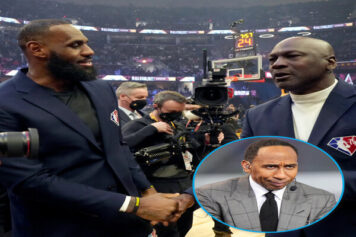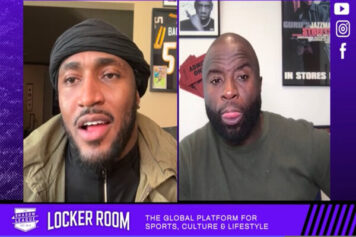LeBron James couldve been a slave.
Or, at least, the closest thing America has to that outside of prison bars: a student-athlete. The HBO documentary Student Athlete, James executive produced mirrors the high school star turned NBA legends longstanding view of the NCAA.
“I’ve always heard the narrative that [college athletes] get a free education, but you guys are not bringing me on campus to get an education, you guys are bringing me on it to help you get to a Final Four or to a national championship, so it’s just a weird thing,” LeBron James told the media after a Cleveland Cavaliers shoot-around earlier this year. “I’m not a fan of the NCAA. … The NCAA is corrupt, we know that.”
Comparing student-athletes voluntarily playing a sport to people forced into hard labor seems like a stretch, but both are predicated on a hypocritical belief that the hard laborers are not equal to the administrators of the labor. Slaves and student-athletes cant select the people who represent their interests, are unable to work anywhere but where the administrators deem acceptable and can have their entire lives changed by the smallest of infractions, which any logical person would deem inhumane.
Former Baylor football player Silas Nacita was one of the documentary’s subjects and made national headlines after Baylor deemed him ineligible to play on the team after he accepted room and board from family friends trying to end the then-22 year olds homelessness. The doc does an expert job of following up Nacita’s story of being homeless with the statistic of Baylor’s football program generating $106 million in the 2014-2015 season and allocating $5.9 million to its head coach. Nacita helped the team win the Big 12 championship in 2014, but the team couldn’t help him find a place to live.
Student Athlete (2018) Official Trailer | HBO
A billion dollar industry, but the players pay the price. From producers Maverick Carter and Steve Stoute and executive producer LeBron James, HBO Sports presents Student Athlete, a documentary revealing the exploitative world of high-revenue college sports. Premiering October 2 at 10 PM on HBO.
That sequence of scenes in Student Athlete is the heart of this documentary unique approach; showing the lives behind the stats. In another harrowing scene, within the first five minutes of the doc, the statistic that only 303 of the 91,775 athletes that played in NCAA basketball and football were drafted to the NBA or NFL is placed over the visual of a car in a parking lot where former student-athlete, 28-year-old Shemar Graves sleeps in because he cant afford rent. These are a few of the innumerable examples of student-athletes fighting poverty after helping college programs rake in billions of dollars that makes NCAA President Mark Emmert claim that players are paid in an education that can set them up for life after college, seem disingenuous.
They can’t get internships or jobs like normal students because the NCAA doesn’t allow it, they’re told to take easy classes that have been pre-decided for them and they’re steered towards majoring in less vigorous subjects, Student Athlete director Sharmeen Obaid Chinoy told The Shadow League. “The majority of coaches don’t care, because they’re incentivized to make sure that the athletes remain eligible. So they’re not really there to get a true education. That’s a fallacy.”
Before the NBA, James faced similar hardships as Nacita. He was forced to miss most of a school year one year because he didnt have transportation to get to school. But Nacita was a walk-on at Baylor, and James was the best high school prospect in the country, at the time. James has admitted that that distinction ensured that at least one college program promised him that if he went to college instead of the NBA, he and his mother weren’t going to be poor for long. Just like on a plantation, everyone is a slave, but the administrators of the labor purposefully make it so everyone isn’t the same slave.
Few aspects of the NCAA highlight its corruptive nature than the bribery between shoe companies and colleges depicted in the documentary. A disguised voice of a shoe company representative is overhead in one scene explaining how an unidentified shoe company pays AAU and other types of teams to have top high school prospects play in the company’s apparel at the company’s sponsored events, helping the shoe company generate millions in ad revenue. The shoe companies then funnel these players to schools the shoe companies have sponsorship deals with so that school can then make millions of dollars off the backs of a player who, on average, may have less than a 1% chance of being able to make any fraction of the money made from him in the pros.
It’s a modern-day slave trade, just with swooshes and college jerseys, instead of prison garbs and chains.
Co-executive producer Maverick Carter told ESPN he would “love to see the film play a part in forcing an overhaul of the NCAA.” But, maybe the NCAA can’t be fixed, because it was built to do exactly as it was intended to. Sometimes when there are so many rules…it keeps you from doing whats right, John Shoop, former NCAA, and NFL coach said in the documentary.
Thankfully, the greatest NBA player of the 21st century didn’t slave away his youth in a corrupt system and is now letting those young men, women and many others that they truly are more than an athlete.



